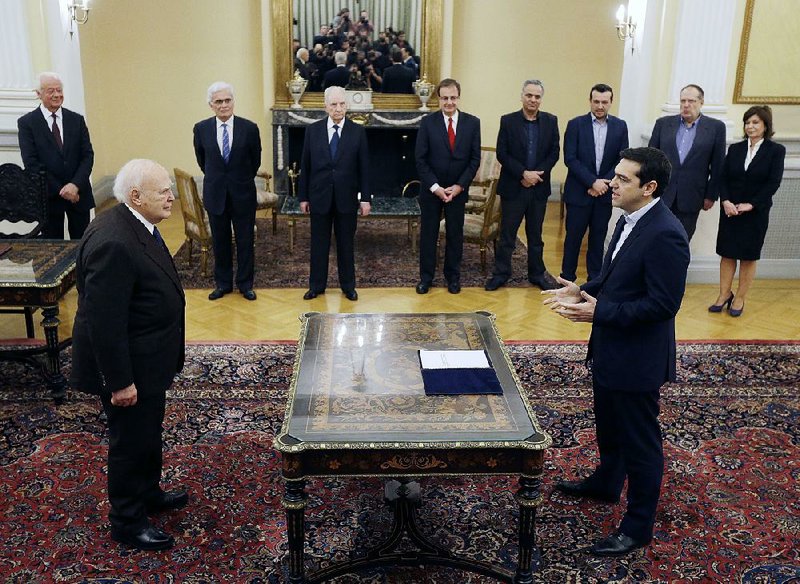ATHENS, Greece -- Alexis Tsipras, the leftist politician of the Syriza party who swept to power in Greece, was sworn in as the country's new prime minister Monday. Tsipras immediately formed a new coalition government to charge into the task of reversing wrenching austerity policies and negotiating with European leaders to reduce Greece's debt burden.
In his first act as prime minister, he laid roses at a monument to 200 Greeks executed by Nazis in May 1944 in the Athens neighborhood of Kaisariani.
Earlier Monday, Tsipras agreed to form a coalition government with a rightist fringe party, Independent Greeks, which won 4.7 percent of the vote and was created in 2012 at the height of an economic crisis. The group has often taken a hard line against austerity and might push for tough terms in any debt talks with Greece's creditors, whom party leaders have referred to as "foreign conquerors."
The group shares Syriza's goal of cracking down on corruption by public officials and has campaigned for the lifting of politicians' immunity from prosecution.
"The Independent Greeks give our vote of confidence to the prime minister, Alexis Tsipras," Panos Kammenos, the leader of the coalition partner, told reporters after about an hour of talks with Tsipras.
However, one point of potential conflict between the partners is immigration: Syriza wants more rights for migrants and asylum seekers, while the Independent Greeks party wants to take a stronger stance against neighboring Turkey to stop a flood of would-be migrants from entering Greece. More confrontational efforts to curb immigration amid an economic downturn have strengthened Greece's neofascist Golden Dawn party, which placed third in Sunday's vote.
Tsipras now has 15 days to hold a confidence vote in his government and was expected to announce his cabinet this week.
European finance ministers meeting in Brussels on Monday were expected to put the developments in Greece high on their agenda. Martin Schulz, the president of the European Parliament, told a German radio station Monday morning that he had congratulated Tsipras immediately after the election but had told him that Greece should not expect significant financial concessions from creditors.
Prime Minister David Cameron of the United Kingdom was more blunt.
"The Greek election will increase economic uncertainty across Europe," Cameron tweeted.
With nearly all the votes counted, Tsipras' Syriza party had won 36.3 percent of votes and secured 149 seats in the Greek parliament, short of the 151 needed to secure a majority.
The New Democracy party, led by the defeated incumbent prime minister, Antonis Samaras, took 27.8 percent of the votes. The Golden Dawn party won 6.3 percent of votes.
Syriza has become the first anti-austerity party to take power in a eurozone country and to shatter the two-party establishment that has dominated Greek politics for four decades.
Officials in Germany reacted swiftly, warning Greeks against abandoning their course of overhauls.
"The Greeks have the right to elect whoever they want; we have the right to no longer finance Greek debt," Hans-Peter Friedrich, a senior member of German Chancellor Angela Merkel's conservative bloc, told the daily newspaper Bild on Monday. "The Greeks must now pay the consequences and cannot saddle German taxpayers with them."
In France, the victory was hailed by President Francois Hollande's Socialist Party.
"The anti-austerity line is reinforced today in Europe," Philip Cordery, the party's national secretary for European affairs, said in a communique. "Since 2012, Francois Hollande and the social-democratic leaders have been working to reorient the European Union. In Alexis Tsipras they have found a new ally."
The far-right leader Marine Le Pen, an opponent of European unification, also welcomed the Greek landslide, tweeting that it represented "the beginning of the trial of 'euro-sterity,' the authority imposed for saving the euro."
Appearing before a throng of supporters outside Athens University late Sunday, Tsipras, 40, declared that the era of austerity was over and promised to revive the economy. He also said his government would not allow Greece's creditors to strangle the country.
"Democracy will return to Greece," Tsipras said to a swarm of journalists as he cast his ballot in Athens. "The message is that our common future in Europe is not the future of austerity."
Information for this article was contributed by Niki Kitsantonis, Jim Yardley and Melissa Eddy of The New York Times.
A Section on 01/27/2015
